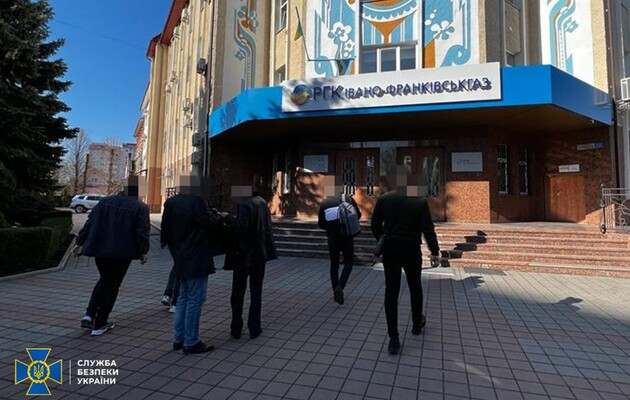Control over Firtash's gas monopoly is easy to say, but...

Last Friday, 16 regional gas companies of Firtash were searched at once. Moreover, two of these companies («Kharkivmiskgaz» and «Krivorizhgaz») will eventually be attempted to merge into «Gas Distribution Networks of Ukraine» LLC, specially created for this purpose on behalf of the National Joint-Stock Company «Naftogaz of Ukraine» ... Actually, this is already the second interception of control. In January, the NJSC brought its management to «Kharkivgaz» and «Dniporgaz» in the same regions.
It was announced that “by the end of the year” all Firtash’s regional gas companies would come under the control of the NJSC. However, in this vast array of plans, a number of questions arise. First: why, in fact, it will happen so late, then? Searches are now taking place in companies that were (legally) placed under the control of state structures last spring.
In May 2022, a court by its decision transferred the corporate rights of 26 gas distribution system operators to the Asset Recovery and Management Agency, following a petition from the State Bureau of Investigation due to non-payment for the use of gas networks. Most of the pipes in the regional gas companies belong to the state.
Ukraine said to the EU “that only 65% of the property of gas distribution systems is in state ownership; 18% - in the municipal; 8% is the property of gas-distributing station operators and 9% belongs to other owners.” It is clear that the situation is different in different companies. Municipally-owned gas distribution systems are located mainly in cities.
Naturally, the state must be paid, but the trick was that five years earlier, the kind people from the Ministry of Energy allowed the bulk of regional gas companies (37 out of 43) not to do this. Now some of the employees from the Ministry of Energy who have allowed this are on the wanted list. Although there are other legal clues to justify “non-payment”.
Regional gas companies were arrested for huge non-payments in 2017-2020, estimated at UAH 1.49 billion. Although even after the arrests of the assets, the pipes were not paid for properly. According to this year's data, three or four out of 43 companies pay for the NJSC networks. In general, now, after a couple of years, the amount of non-payments has increased.
However, against the backdrop of the total mass of the regional gas companies, debts for the delivered resource (they are rapidly approaching a hundred billion hryvnias), non-payments for pipes were definitely a pretext, not the main problem. Despite everything, the process was launched, and then there was a long pause.
The regional gas companies did not stay long in the Asset Recovery and Management Agency, they were transferred to the management of the NJSC’s «Chornomornaftogaz», where they were safely stuck.
The representatives of the NJSC were not up to it, there was a rearrangement of management, and they got round to the “gift” only by October, when it had the third manager within a year. The new project did not inspire enthusiasm among the management, since the previous experience was not rosy. «Naftogaz» has been trying to restore order in «Kirovohradgaz» controlled by it for years. The case proceeded with obvious difficulties. As a result, (in the best case) the regional gas companies occupied an average position in terms of settlement indicators. Then, right before the war, the front-line «Donetskoblgaz» was assigned to the NJSC.
In addition, the management of «Naftogaz» was frankly delaying the admission of new structures to management. Back in the summer of 2021, the National Security and Defense Council of Ukraine (NSDC) decided to return «Cherkasyoblgaz» to state ownership, but only a year later it was somehow formalized. Then, somehow, suddenly, there was a sharp formation, more than two dozen companies, with tens of millions of users. It is clear that starting to quickly manage this enterprise was doomed to failure, since at that time there were no personnel, no skills.
According to unofficial data, there were contacts with Firtash about the conditions for a further way out of the situation ... but, unfortunately, it was not possible to agree. (Arakhamia met with Dmitry F. in November not only on titanium issues.)
In fact, this meant that control over gas flows remained in the hands of Firtash's Regional Gas Company (RGС). While the NJSC imitated the process of eating an elephant piece by piece. It took several months to create a subsidiary structure, namely LLC «Gas Distribution Networks of Ukraine» («Gazmerezhi»). At the end of the year, it received its first management license, and it was ... «Kirovohradgaz» that belongs to the NJSC. Only after that, in January 2023, attempts to work with the «Kharkivgaz» and «Dneprgaz» companies began.
Although the way this work began, to put it mildly, did not please. The official position was extremely vague: «Chornomornaftogaz», which is part of the «Naftogaz of Ukraine» Group, in compliance with the requirements of the law, made decisions on the above regional gas companies, which were controlled by the RGС. They relate to corporate issues, including the change of management».
The breakdown of "corporate issues" was as follows. «Chornomorneftegaz» appointed its supervisory board, which fired the management of regional gas companies and put its own. It sounded great, but in order to change the supervisory board, it was necessary to hold a meeting of shareholders, and at that moment it just did not exist. As a result, Firtash was given a great opportunity to challenge the actions in the courts (if not in ours, then in international ones).
At the same time, there was quite a real (including legally) scenario of starting work with these enterprises under the conditions of the martial law, as the case was with the «Ukrnafta» company or the Kremenchuk Oil Refinery. Instead, a legally vague scheme emerged. As a result, the manager who created LLC «Gas Distribution Networks of Ukraine» («Gazmerezhi») gave an optimistic interview about the prospects and ... resigned a month later.
A clear surprise for the NJSC was the problem with customer service. The «Regional Gas Company», which managed the regional gas companies of behalf of Firtash, was not at all eager to give away its electronic services. This week, the Security Service of Ukraine was involved in the issue. Will it help start the services? We'll see, but so far skepticism prevails.
In addition, there remains the problem of an acute shortage of the managerial staff (naturally, not those who simply sit in a chair). By the way, hence the very cautious plans to complete the process “before the end of 2023”.
Over the years, RGC has hired the best specialists for itself and there are not so many similar highly qualified workers on the labor market. In addition, in Kharkiv region, gas pipelines were seriously damaged by hostilities, making up to half of all damage to gas networks in the country.
A separate topic is the creation of another supermonopoly on the market, but it is too early to be horrified by this issue. Firstly, there is a war. Secondly, it has not yet been created. The NJSC even promises to sell extra assets later. Although who will buy a company with such a dubious past is a curious question. All the same, these are problems of the future.
Nevertheless, it is already clear what will happen to the debts, namely, they will be forgiven. The NJSC has already announced that the newly created company (and those regional gas companies that will be included in it) will not return old debts for consumed gas. This is a question for the previous owners. And for them...For them, force majeure has been kindly created. Bingo.
Among the victims is the «Gas Transmission System Operator of Ukraine» (GTS), - in theory, it was owed about UAH 17 billion. In fact, it lost several times more. In 2020–2021, trunk line operators bought a lot of cheap gas for the GTS. Regional gas companies successfully used it, but it did not work out with settlements, even at low tariffs. Now it is impossible to buy even a third of that volume of gas with that sum of money.
Although no one was actually eager to return the debts to the «GTS Operator». They even boldly planned to make new ones. For example, «Dniprogaz» has budgeted as much as 0 (zero) hryvnia for gas transportation in 2023. One might wonder if they'll change the number now?
Frankly, it is too optimistic to count on the repayment of old debts. The question, rather, is whether the pace of their growth will increase or slow down.
Now the idea was voiced to carry out another mutual offset of debts, but this issue requires a decision of the Parliament. In addition, a value-added tax (VAT), in the amount of a couple of tens of billions of hryvnias will not go anywhere. Moreover, the IMF will definitely not be delighted with another financial operation.
In general, so far only a paradise for lawyers and litigation has been created. Highly likely, not by accident.
It should be noted that this topic is serious: the citizens of Ukraine survived this winter normally because the state was running out of old fuel reserves and the winter again (for the fifth year in a row) turned out to be warm. Plus, there were reserves in UGS facilities, not very large, but enough. However, according to rumors, in 2023 there will be another winter. And again, gas reserves are needed, but they have become smaller.
While there seems to be more mess in the system. I would like it the other way around. We have enough plans. Only time for them runs out, and the risks are higher.
Read this article in russian and Ukrainian.
Please select it with the mouse and press Ctrl+Enter or Submit a bug














 Login with Google
Login with Google